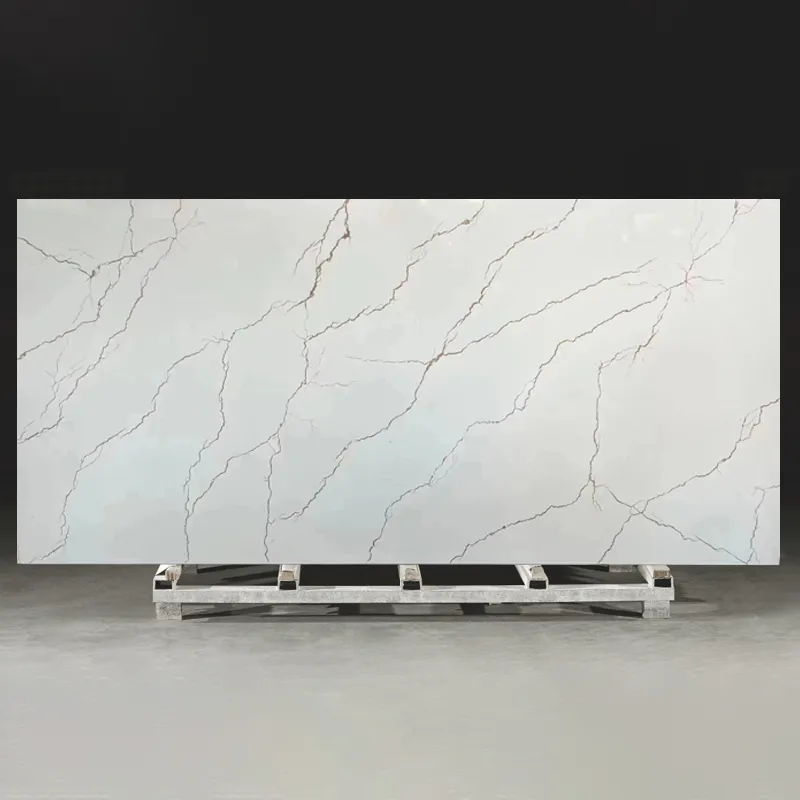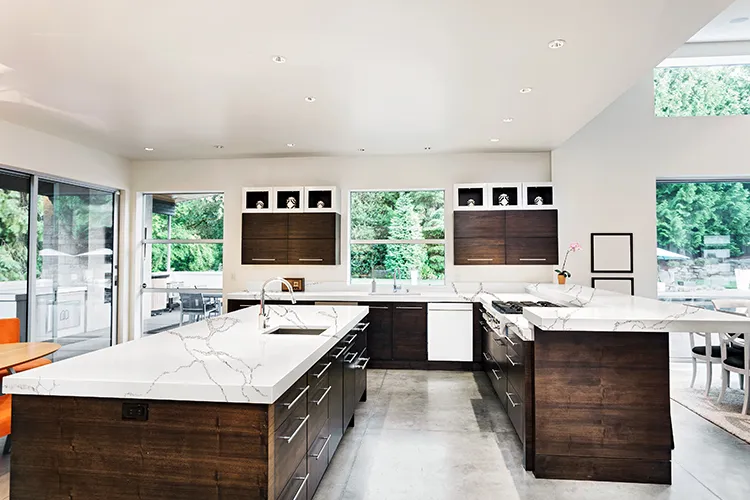Marble countertops are not only a visual focal point in kitchens and bathrooms, they also add an air of elegance to the entire home space. However, this natural stone is also known for its vulnerability to stains and scratches. Therefore, it is important to properly clean and maintain your marble countertops to maintain their long-term beauty and functionality. In this newsletter, we will take an in-depth look at how to clean marble countertops like a pro and easily maintain their elegant brilliance.
Table of Contents
1. Understanding Marble Countertops
1.1. The Unique Properties and Appeal of Marble Countertops
1.2. The Importance of Proper Cleaning and Maintenance
1.3. Addressing Common Misconceptions About Cleaning Marble Countertops 2. Basic Tools and Cleaners
2.1. Necessary Tools for Cleaning Marble Countertops
2.2. The Importance of Using Mild, Non-Abrasive Cleaners
2.3. Eco-Friendly Alternatives to Cleaning Solutions
2.3.1. Natural Citrus Cleaners
2.3.2. Baking Soda Paste
2.3.3. Vinegar Solutions
3. Step-by-Step Cleaning Guide
3.1. Preparing Countertops
3.2. Cleaning Surfaces with Appropriate Cleaners
3.3. Drying and Polishing Marble to Restore Its Natural Sheen 4. Tips for Treating Specific Stains
4.1. For Coffee Stains
4.2. For Wine Stains
4.3. For Oil Stains
4.4. The Importance of a Regular Cleaning Routine
5. Precautions for Cleaning Marble Countertops
6. Tips for Caring for Marble Countertops:

1. Understanding Marble Countertops
The Unique Properties and Appeal of Marble Countertops
Marble is a metamorphic rock that is formed by the transformation of limestone under high temperatures and pressure, resulting in unique textures and colors. This stone is highly sought after for its noble appearance and unique natural textures, especially in kitchen and bathroom countertops. Each piece of marble has a unique pattern, which makes each marble countertop a work of art.
However, it is this uniqueness that makes marble countertops require special attention when it comes to cleaning and maintenance. Marble's surface is relatively porous and easily absorbs liquids and dyes, causing stains and etching. The fragility of this stone means that daily cleaning requires extra care to avoid damaging its natural beauty.
The Importance of Proper Cleaning and Maintenance
For marble countertops, proper cleaning and maintenance are not only the key to maintaining their pristine appearance, but also to extending their lifespan. Improper cleaning methods or the use of the wrong cleaning agents can cause scratches, discoloration, or even permanent damage to the marble surface. Therefore, knowing how to properly clean and maintain marble countertops is a skill that every marble countertop owner should master.
For example, many people may not know that acidic cleaners react with the calcium carbonate in marble, causing the surface to lose its gloss and cause etching. Similarly, using a hard-bristled brush or abrasive cleaners may leave tiny scratches on the marble surface, ruining its smooth texture.
Addressing Common Misconceptions About Cleaning Marble Countertops
There are many common misconceptions about how to clean marble countertops. Here are some of the more common misconceptions and their correct answers:
● Myth 1: You can clean marble countertops with vinegar. Although vinegar is a common ingredient in many household cleanings, it is not friendly to marble. The acidity of vinegar can destroy the gloss of marble and cause surface etching. Therefore, never use vinegar to clean marble.
● Myth 2: Marble countertops do not need to be sealed regularly. In fact, regular sealing of marble countertops can effectively prevent liquid penetration and reduce the occurrence of stains. Depending on the frequency of use, it is recommended to seal marble countertops once a year or every two years.
● Myth 3: All cleaners are suitable for marble. Marble is a natural stone that is very sensitive to chemicals. Using the wrong cleaner may cause permanent damage. Choosing a mild cleaner designed specifically for marble is the safe and reliable way to clean.
2. Basic tools and cleaners
Necessary tools for cleaning marble countertops
To clean marble countertops like a pro, you first need to have the right tools. Here are some basic tools:
● Soft cloth or sponge: for cleaning the surface to avoid scratches.
● Spray bottle: for holding cleaning solution for easy use.
● Soft brush: for cleaning hard-to-reach corners and crevices.
● Absorbent towel: for drying the surface to prevent water spots from forming.
● Polishing cloth: for final polishing to restore the marble to its natural luster.
Although these tools are simple, they can effectively help you avoid damaging the surface when cleaning marble countertops.
The importance of using mild, non-abrasive cleaners
Although the surface of marble is beautiful, it is also quite fragile. Therefore, when choosing a cleaner, be sure to choose a mild and non-abrasive product. Avoid using cleaners with acidic or alkaline ingredients, such as lemon juice, bleach, and ammonia, which can corrode and etch the marble surface.
Cleaners designed for marble are usually neutral and specially formulated to ensure that they will not damage the surface of the stone while cleaning. Using these cleaners, you can effectively remove everyday dirt and fingerprints without negatively affecting the natural shine of the marble.
Eco-friendly alternatives to cleaning solutions
In addition to commercially available cleaners, there are some eco-friendly cleaning solutions that can help you easily clean your marble countertops. These natural ingredients are not only safe and environmentally friendly, but they can also effectively remove stains and protect the surface of the marble. Here are a few common eco-friendly cleaners:
Natural citrus cleaners
Citrus fruits such as oranges and lemons contain natural oils and acids that can effectively remove oil and dirt. Although acids are potentially corrosive to marble, when they are diluted and mixed with other ingredients, they can form a gentle cleaning solution. For example, you can mix lemon juice and orange peels with water and a little bit of neutral detergent to make a natural citrus cleaner. This cleaner will not only remove stubborn stains, but also leave a fresh aroma.
Baking soda sauce
Baking soda is a very mild abrasive that can be used to clean minor stains on marble countertops. Mix baking soda with a small amount of water to create a thick paste. Apply it to the stain and then gently wipe with a soft cloth. Rinse with clean water. This method is both gentle on the marble surface and effective in removing stains.
Vinegar Solution
While vinegar is not suitable for daily cleaning of marble, it can be used as an environmentally friendly alternative for cleaning certain specific stains when diluted and mixed with other ingredients. For example, vinegar mixed with water in a ratio of 1:10 and a few drops of mild detergent can be used to clean kitchen and bathroom areas that do not involve marble surfaces. Please note that when using vinegar solution, it is important to avoid direct contact with the marble to avoid etching.

3. Step-by-step cleaning guide
Preparing the countertop
Before cleaning a marble countertop, first remove all items on the countertop, such as knives, spice bottles, decorative items, etc. Next, gently wipe the surface with a soft cloth or sponge to remove dust and loose dirt from the surface. This step is very important because if these particulate matter are not removed first, subsequent cleaning processes may cause scratches on the surface.
Before cleaning, you can also fill a spray bottle with warm water and gently spray the countertop to loosen surface dirt. This will make subsequent cleaning easier and more efficient.
Clean the surface with an appropriate cleaner
Next, clean it with a mild cleaner of your choice or an eco-friendly alternative. Spray the cleaner on the countertop and gently wipe it in circular motions with a soft cloth or sponge. Make sure to clean the entire surface, especially those areas that are frequently used, such as around the sink and cooking areas.
During the cleaning process, avoid using too much water or letting the cleaner sit on the marble surface for too long. Excessive moisture may penetrate the pores of the marble and cause discoloration or water stains on the countertop. After cleaning, wipe the countertop thoroughly with a clean damp cloth to remove any residual cleaner.
Dry and polish the marble to restore its natural shine
After cleaning, wipe the countertop thoroughly with a highly absorbent towel or polishing cloth. Make sure there is no residue of moisture or cleaner left, as these may form water stains or streaks after drying.
Finally, use a clean polishing cloth to gently buff the marble countertop in circular motions. This step will not only restore the marble's natural shine, but it will also provide an extra layer of protection for the countertop, making it more difficult to stain.
4. Tips for dealing with specific stains
Even if we are careful, some specific stains will inevitably appear on marble countertops. For these stains, you can use the following methods to deal with them:
For coffee stains
Coffee stains are a common problem on marble countertops. Since coffee contains pigments, if they are not cleaned up in time, they may cause the countertop to discolor. The best way to deal with coffee stains is to wipe them immediately with a damp cloth and then clean them with a mild detergent. If the stain has dried, you can use baking soda paste to gently wipe it, and then remove the residue with a damp cloth.
For wine stains
Wine, especially red wine, is rich in pigments and can easily leave stains on marble countertops. Similar to coffee stains, wine stains should also be dealt with as soon as possible. You can clean the stains with a solution mixed with warm water and neutral detergent, and then wipe them dry with a clean cloth. For stubborn red wine stains, try applying baking soda paste to the stain and letting it sit for a while before cleaning it with a damp cloth.
For Oil Stains
Oil stains can seep into the pores of marble, causing lasting stains. To tackle oil stains, you can use baking soda or cornstarch. Sprinkle it on the stain and let it sit for a few hours before wiping it off with a damp cloth. If the stain is still there, you can repeat the process until the stain is completely gone.
Importance of a Regular Cleaning Routine
In order to avoid stubborn, hard-to-remove stains on your marble countertops, regular cleaning is essential. It is recommended to wipe your marble countertops with warm water and a soft cloth every day and use a mild detergent for a thorough cleaning once a week. Regular maintenance will not only prevent stains from forming, but will also extend the life of your marble.

5. Precautions for Cleaning Marble Countertops
There are also some precautions to keep in mind when cleaning your marble countertops to ensure that you don't inadvertently damage the countertop. First, never use acidic or abrasive cleaners, as they can damage the surface of the marble. Secondly, avoid using hard brushes or steel wool, which can leave scratches on the countertop that are difficult to repair. Finally, do not let cleaners or liquids sit on the marble surface for a long time, as this may cause permanent stains or corrosion.
6. Marble Countertop Maintenance Tips
In addition to proper cleaning, it is equally important to maintain your marble countertops regularly. Here are some tips to help keep your marble countertops shiny and beautiful:
● Seal regularly: It is recommended to seal your marble countertops every year or two. This helps prevent liquids from penetrating the marble and reduces the formation of stains.
● Use mats and trays: When placing hot pots or wet items on marble countertops, using mats or trays can avoid heat damage and water stains.
● Avoid prolonged exposure to sunlight: Long-term direct sunlight may cause marble countertops to fade. Therefore, if possible, avoid exposing your marble countertops to sunlight.
I hope this news can provide you with useful information so that you can clean your marble countertops easily and elegantly like a professional.
Whether you need customized countertops or durable roof tiles, Rongguan’s high-quality building materials are the perfect choice. With over 10 advanced production lines, we combine innovation with cost-efficiency to offer low prices. Don’t miss our limited-time sales discounts!

